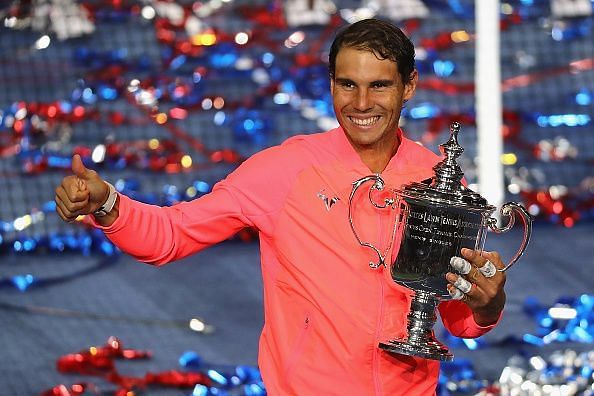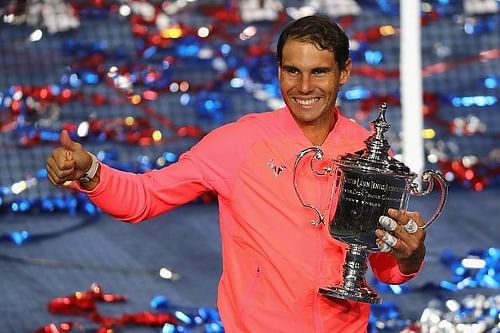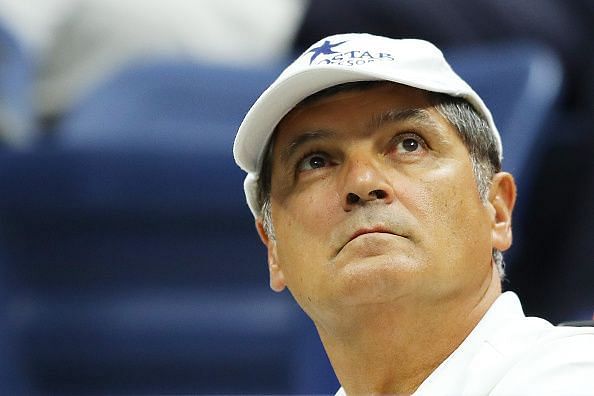
Rafael Nadal's US Open win makes more sense than even the most perfectly composed symphony

Some things just make complete sense. When Heath Ledger wins the Oscar posthumously for his unnerving portrayal of The Joker, you know everything is right with the world. When an A R Rahman concert sells out faster than you can say 'maestro', humanity seems salvaged. When cream cheese and Graham crackers combine to make the perfect cheesecake that melts in your mouth, you struggle to imagine how anything could go wrong with the planet.
But you know what wouldn't have made sense? Kevin Anderson winning the 2017 US Open.
Don't get me wrong; if Anderson had put in the match of his life to defeat Rafael Nadal in the biggest upset of all time, he would've fully deserved the trophy. Nothing matters more than what you showcase on the court - not your ranking, not your reputation, and definitely not your 'talent'.
And yet, if Nadal had somehow lost the last Grand Slam match of 2017, it would've felt thoroughly disconcerting. How can anyone script a comeback story for the ages, only to falter at the last, most improbable hurdle?
Fortunately for our sanity, the impossible didn't happen. Nadal duly completed the formality of straight-setting the South African, and everything felt right with the world. Anderson had his breakthrough moment anyway - his celebration on winning the semifinal seemed rather climactic - and the Spaniard could still give Toni Nadal the perfect farewell gift.
What does the tennis world think about Toni as he parts ways with his nephew? Before the final, the number of people in the world who thought Anderson was the favourite could probably have been counted on one hand...and Toni would have been among them.
His insistence on always adopting the role of the underdog, of inviting suffering as a routine and necessary part of your existence, is reflected more vividly in Nadal's game than we'd like to imagine. The refusal to ever take the foot off the gas because he didn't think he was good enough to take any point lightly and get away with it; the frequent retreating behind the baseline because he didn't think he had quick enough hands to take the ball on the rise; the physically draining amount of vicious topspin imparted to every stroke because he didn't think he had enough flat power to hit through his opponents - everything about Nadal's style of play screams 'suffering'.

To me, Toni's methods and words always seemed a little negative; almost fatalistic. How can a healthy champion's mind be nurtured in an environment where you are always forced to believe you are not good enough?
Because Nadal certainly is good enough; he always has been. Irrespective of how lowly he thinks of himself, he's always had the tools to do things - hit a shot, run for a ball, devise a winning strategy - in a way that few others in the world can.
Maybe Toni's biggest accomplishment was to recognize that simple fact, and do everything in his power to hide it from his nephew. His methods may never find a place in a new-age coaching manual, but by making Rafael believe he didn't have the gifts to compete with the best, he convinced his protege to never stop improving himself.
The approach has led to 16 Slams, so Toni probably doesn't give a tiny rat's ass about whether anyone thinks he's too negative or fatalistic. And that haul has been built step by step, with the Matador slowly and painstakingly honing every part of his game to adapt to every situation he faced - just as his uncle would have liked.
But not long ago, 16 seemed like a faraway dream. While Rafa already had a more-than-phenomenal Slam tally, his game seemed to have hit a wall, and much of the blame for that was hurled at his uncle.
The dark period of struggle in 2015 was perhaps the best thing to have happened for the duo. Not because it helped the younger Nadal embark on a new phase of his career - he would have done that anyway. But because it showed us all that we may sometimes attach a little too much importance to the work of a mentor.
It was Nadal who finally decided to add other eyes to his coaching team, and everything that's happened since that change-up has also been largely down to him.
Carlos Moya has frequently been credited with Nadal's newfound aggressive streak, but we forget that Nadal has played attacking tennis at many points of his career. Conveniently, the two most vivid examples of that are his previous two wins in New York. In both 2010 and 2013, he cranked up his serve, stood closer to the baseline, and hit the down-the-line forehand more often than usual.
Yes, Moya may have helped Nadal make these facets a more permanent part of his game now. But without Rafa's natural gifts, without his muscular strength, without his willingness to put theory into practice while out there on the court, he would've been the same defensive counterpuncher that struggled on hardcourts in the early part of his career. And no matter how hard Toni made him work as a kid, Rafa would have never become the claycourt colossus that he is today without his innate understanding and execution of controlled play.
Nadal's win over Juan Martin del Potro in the semifinal was a lesson in hardcourt tennis. And neither Moya nor Toni can claim the lion's share of the credit for that - simply because neither of them truly knows what it takes to win a hardcourt Slam, and neither can hit Rafa's shots for him. When push comes to shove, it is the player himself who is the sole architect of his fortunes, to borrow a phrase from a famous ITF tribunal ruling.
Some would insinuate that push never did come to shove for Nadal at the 2017 US Open, bandying about the petty statistic that he didn't face a single top 25 player in his run. But Nadal's win is just as hollow as Federer's 2006 Australian Open - where he faced Marcos Baghdatis in the final, or Andy Murray's 2016 Wimbledon victory - where the Scot didn't encounter any of the Big 4.
You can only defeat the player who shows up on the other side of the net; it's not your fault if all the top players decide to lose. If anyone has to be blamed for the relatively drama-less proceedings at this year's US Open, it is the rest of the ATP field.
For years we've been led to believe that the ATP is susbstantially superior to the WTA because the men's field is so unbelievable deep and strong. But maybe the rest have always been low on quality, and the brilliance of the Big 4 has been masking their incompetence all this while?
Chalk yesterday's result up as a brownie point for gender equality, or as the death knell of pointless 'weak era' debates. Either way, it's a 'win' alright.
Getting back to serious matters, the year-end No. 1 ranking has all but been sealed, and the long-missing World Tour Finals trophy seems within grasp. Moreover, the conversation has shifted from 'Will Nadal ever win another non-clay Slam?' to 'How long will it take for Nadal to overtake Federer's Slam tally?'. But I seriously doubt the man himself is thinking about any of this.
Right now, Nadal probably wants to do nothing more than go back to Mallorca, hit the beach, and spend some tennis-free time with Toni. The man was his uncle before he was his coach, and irrespective of how much influence we may think he had on his career, the two of them belong together - as part of a happy family.
Just like Nadal's 2017 US Open win, the image of him relaxing on the beach while surrounded by his family makes sense. All those years of sweat and toil deserve to culminate in a stress-free time under the sun.
Kevin Anderson may not agree with that, but 16 Grand Slam trophies do.